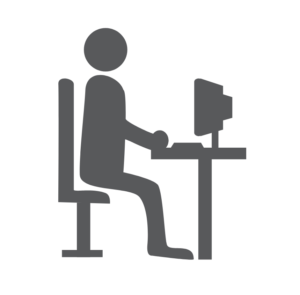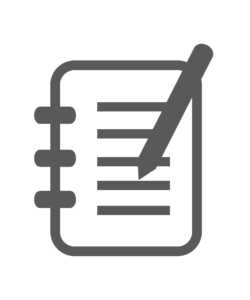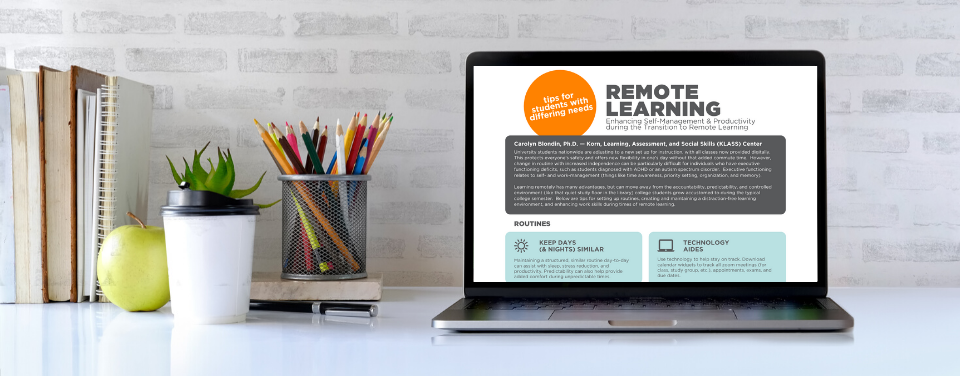Enhancing Self-Management and Productivity during the Transition to Remote Learning
Carolyn Blondin, Ph.D. – Korn, Learning, Assessment, and Social Skills (KLASS) Center
University students nationwide are adjusting to a new set up for instruction, with all classes now provided digitally. This protects everyone’s safety and offers new flexibility in one’s day without that added commute time. However, change in routine with increased independence can be particularly difficult for individuals who have executive functioning deficits, such as students diagnosed with ADHD or an autism spectrum disorder. Executive functioning relates to self- and work-management (things like time awareness, priority setting, organization, and memory). Learning remotely has many advantages, but can move away from the accountability, predictability, and controlled environment (like that quiet study floor in the library) college students grow accustomed to during the typical college semester. Below are tips for setting up routines, creating and maintaining a distraction-free learning environment, and enhancing work skills during times of remote learning.
ROUTINES
Keep days (and nights) similar. Maintaining a structured, similar day-to-day routine can assist with sleep, stress reduction, and productivity. Predictability can also help provide added comfort during unpredictable times. If you do not already have a set (or at least approximate) bed- and wake-time (even on the weekends), this is the time to start. Although you do not have to commute, make sure to allow enough time to wake up/get mentally ready before your first class.

Technology Aides. Use technology to help stay on track. Download calendar widgets to track all zoom meetings (for class, study group, etc.), appointments, examinations, and due dates. Mark everything down in the planner, and check it often (at least three times a day!). Set alarm reminders 10 minutes prior to class to get comfortable, gather needed materials, and prepare your computer, tablet, or smartphone.
Digital to-do lists can also help you stay on track with what you need to do. Larger projects should be broken down into smaller parts, with sub deadlines that you can put into your calendar. Enjoy the satisfaction of checking items off your list.
Have a watch handy. Keeping track of how long tasks take can help with project completion and work awareness. Setting the timer to go off on set intervals (e.g., every 10 minutes) helps to remind you to stay on task, and to put down your phone or other distractors.
Power Hour. With increased flexibility, you have more control over when to tackle more challenging tasks. Take time to identify your high energy, and low energy, times. Example: Are you an early bird who flags a bit after lunch? Arrange your day to do more difficult work in the morning (think paper writing), and then give yourself a break with an easier task following lunch (such as updating blog or answering emails). Avoid multi-tasking; try to focus on one task at a time to maximize productivity.
ENVIRONMENT
Allocate a workspace. Find a workspace for class, studying, and homework that is quiet and as distraction-free as possible. If using your room, shut the door and consider putting up a sign. Have a back-up space in mind you can go to as needed to break the boredom, avoid un-anticipated interruptions, etc. Figure out what background noises you best respond to; some prefer soft music or a white-sound machine, while others need complete silence.
Lastly, set some limits for yourself and phone use. Place your phone on the charger in a location outside of arm’s reach, or– better yet– put it outside the room in which you are doing your work. This makes it harder to mindlessly check it during scheduled work periods.
Set boundaries. Set polite but firm rules for others in the house during class times and identified work hours. During class and times of study, turn off notifications aside from alarms. While watch, phone, and computer notifications are helpful to alert us of someone wanting our attention, they can also terribly distracting for that same reason. Instead, have a set time to allow yourself to check email, phone, etc. Notifications also break work momentum, increasing the chances to get sidetracked entirely from what you are intending to do.
MANAGING WORK AND STAYING MOTIVATED
Goal Setting. Consulting your planner or to-do list, identify a handful of tasks you would feel good about completing each day. Sharing a primary goal to accomplish with an accountability partner (a classmate, parent, significant other) can offer extra motivation to stay on track.
Not sure where to start? Order your to-do list by priority, considering upcoming deadlines, importance, and time needed to complete projects. Priority setting can be organized in different ways, such as by color (e.g. red is most important, green is least) and number (e.g., using 1 to 3 scale).
Work Initiation. Getting started on tasks can be very difficult for those with executive functioning deficits. Overwhelmed with a big project? Take time to break down tasks into smaller parts, and start with an easier step on the task list.

Sometimes the study period you allocate is too long; you may actually be more productive when you see how much you can get done within a 20 minutes period than if you gave yourself an hour without a break.
Treat yourself to small rewards (those that take 30 minutes or less) when completing small tasks. Give yourself permission to watch a short show (but turn off the automatic “play next” feature if using a streaming source), scroll articles, check in with friends, exercise, take a walk, etc. when you complete a goal on your list. When getting started on a task, remind yourself what you can do after the needed task is done.
Digital study groups. As exams approach, set up study groups with a group of classmates. Teaching material in your own words and aloud to others helps the information stick in the brain. Check with classmates regularly for clarification on projects and taught material. Study groups can be a fun but productive way to connect with others.
OTHER QUICK TIPS
Stay organized. Set up digital (or actual) folders for all your classes. Daily, make sure class-notes taken are dated, labeled, and placed in designated folders.
Stay present throughout each class by taking notes, participating based on comfort level, and reach out to professors or teaching assistants with questions you have.
Prioritize self-care. While also physically distancing, engage in activities you enjoy, exercise, connect with others, and prioritize healthy eating and sleeping habits.
SUPPORTS ON CAMPUS
The KLASS Center offers time management and organization services for individuals with ADHD and autism, with services available through Zoom.
The Student Success Center offers online assistance for academic coaching, tutoring, and supplemental instruction. They have also identified other tutoring services on campus here.
Tutoring is also available through the Multicultural Student Life Center, with a booking made via the student’s MyUTK Portal.
The Writing Center offers video- and email-based writing help.
UT’s Student Disability Services is continuing to provide support to students needing disability-related course accommodations. Find information here.
OTHER RESOURCES
Dartmouth’s Remote Learning Resources
Virginia Tech’s Study Skills Information
